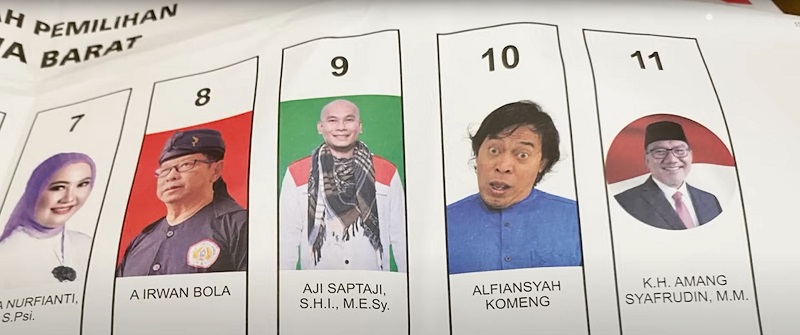
21 Mar Blog | Laughing all the way to Senayan
By Taufiq Hanafi.
Recent events in Indonesian politics, commonly characterized by chaos and the role that money plays, tell a story of tragedy and farce.
The unexpected resignation of Ratu Ngadu Bonu Wollah, once seen as a beacon of hope for women in East Nusa Tenggara (NTT), from her candidacy for the Indonesian parliament sent shockwaves throughout the province and beyond. Her departure is illustrative of behind-the-scene deals that influence personal choices.
Wulla’s sudden exit marks a shift. Stepping into her shoes is Viktor Laiskodat, a controversial figure during his tenure as governor of NTT. Laiskodat’s past antics, such as obligatory sperm checks for village heads and harsh measures like instructing the police to break criminals’ legs, hint at a particular style of governance. His rise to power reflects a trend of individuals with dubious backgrounds securing influential political positions.
The response from Wulla’s party, NasDem Party, that her decision was personal, falls short. It fails to recognize the disappointment felt by those who believed in Wulla’s vision for change and who had supported her by giving her their vote. Wulla later disclosed that she was pressured to resign by Surya Paloh, the NasDem Party chairman, in exchange for a political reward – a disclosure that further erodes the public’s trust in the political process, where commitments are easily cast aside.
Elsewhere in Indonesia, family connections mix with ambition and blur the line between nepotism and meritocracy. The appointment of the president’s oldest son as vice president and the sudden rise of his youngest son to political party leadership suggest a web of relationships where influence is traded like any other commodity. Similarly, the sudden emergence of Megawati’s granddaughter in politics, overshadowing seasoned politicians like Bambang Pacul, highlights the dynastic currents that run deep Indonesian politics. More frustrating, even bewildering, is when individuals like Muhammad Hasan Abdillah, or Hasan Jr., a YouTuber notorious for bad pranks, secure a place in Jakarta’s parliament.
All of the above point to the fact that entry into politics requires neither integrity nor expertise. Prabowo himself has ironically highlighted how Indonesia’s messy and costly democratic process distorts its principles. Democracy’s true spirit becomes clouded by backroom deals and selfish interests.
However, amidst the political misbehaviors, one finds an anomaly.

Comedian Alfiansyah Bustami, better known as Komeng, exceeded all expectations by securing astounding success in the Senate election. Beating 53 other candidates from his province, Komeng received over 5.3 million votes, ensuring his path to Senayan, the metonym for Indonesia’s parliament.
What makes this win by the 53-year-old comedian more extraordinary is his campaign approach – or rather lack thereof. In contrast to politicians who heavily engage in campaigning, Komeng’s candidacy remained under wraps until election day. It was when voters spotted his comical photo at polling stations and on ballot papers that they realized he was running for office. His campaign thrived on curiosity and humor rather than on political maneuvers.
More importantly, Komeng’s election bid stands out for its transparency. According to the Ministry of Finance, running for a seat in Senayan requires a minimum of 1 billion rupiahs without any guarantee of success. This mirrors the findings from Aspinall and Berenschot’s research in Democracy for Sale (2020), which exposes clientelism entrenched within Indonesia’s political system due to political expenses. But, Komeng goes against these established norms: he ran his campaign without spending any money, refrained from buying votes, and had no ties to political parties or backers. Komeng’s refusal to partake in bad political practices is refreshing. He stands out against the prevalent corruptive influences in Indonesian politics and challenges the belief that only the wealthy can take up political positions.
With a touch of humor, Komeng revealed that his decision to enter politics was sparked by his disappointment with the absence of a designated ‘Comedy Day’ in Indonesia. Despite presenting proposals to Senayan, bureaucratic hurdles prevented any progress on this front and led him to unexpectedly venture into legislative candidacy.
Granted, in the transition from comedy to politics, Komeng lacks the background and experience. While his comedic talent is indisputable, his political skills have yet to be put to the test. Nonetheless, his choice to enter the political scene underscores a genuine concern for the development of national culture and the acknowledgement of comedy as an art form that blends humor with civic engagement.
As votes were counted at polling stations, the expression of joy ‘Uhuy’ rang out whenever Komeng’s name was mentioned. With cheers and chuckles echoing through the polling stations, it became evident that Komeng’s appeal lies in his ability to entertain and connect with people.
All in all, within the laughter and mirth lies a message. Komeng’s resounding victory signifies society’s yearning for change, a rejection of the status quo, and a belief in the positive effect of humor. Whether his time in Senayan will bring about an era of satire or simply serve as a temporary distraction remains to be seen. But for now, Indonesians find comfort in the brand of humor offered by a comedian-turned-politician.
Taufiq Hanafi is a guest researcher at KITLV. His research interest is in cultural politics, especially in regards to the production, regulation, supervision and distribution of (literary) texts. He has recently completed his PhD thesis that looks into knowledge production in Indonesia under the New Order authoritarian regime and the state censorship that surrounds it.
Photo: official photo of Alfiansyah Bustami Komeng as displayed in the 2024 General Election ballot paper. Source: KPU.




No Comments